Pushed On to Athens. The Plight of Refugees On Samos Island
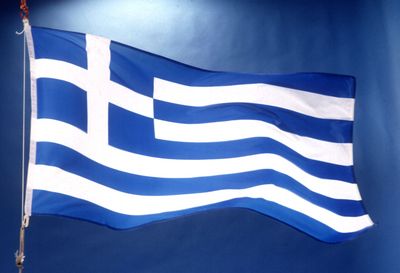
“I prayed for the entire journey to Samos. I was terrified. We left Izmir at 1am and landed on Samos four hours later. It was four hours of fear. There were 43 of us in a 6 metre plastic boat. We were told that there would be 20 of us travelling. But when we got to the beach there were over 40 of us including families with young children and 2 babies and one woman who was pregnant.
The smugglers were nasty. When we complained that there were too many of us for the boat they just ignored us and pushed us with sticks to get in. They didn’t show any care for us.
The only time I felt that anyone cared for us was when the Greek coastguard found us near to Samos. They stopped us and checked that we were all ok. 2 people in our boat were sick and they were taken on to their boat. The rest of us were told to go on to the shore and they pointed to where we could make a safe landing.
…One of our group who couldn’t afford the $1,500 to make the crossing was told he must steer the boat. They gave him 5 minutes to learn about the motor and then we went. We were so low in the water that we were soon flooded and soaked to the skin. We were all very scared. Thanks be to God that we made it and no one died” (Mamoud, 19 years old, student from Aleppo, Syria).
This is what we hear everyday. It is the same story for every refugee landing on the island. And now there are anywhere between 100 and 200 refugees landing every day. Yesterday morning the weather was beautiful and the sea was smooth like a mirror. And all we could see were life jackets floating on the water. It is heartbreaking. And it is made so much worse because every day there is a ferry leaving Kusadassi for Samos at a cost of around 30 euros. A safe passage for refugees does not need to be created. It is here already. Yet the refugees are refused passage.
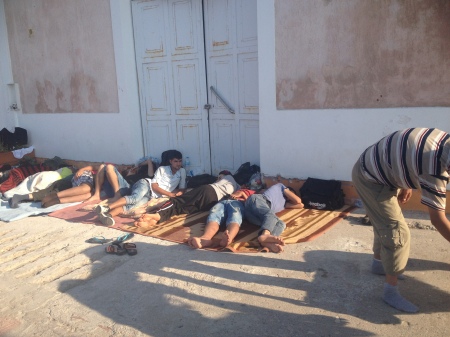
Image: Resting at Karlovassi Port
Nothing is certain here and things change day by day. But one thing is abundantly clear; despite knowing that the summer would bring many more refugees to Samos there has been no planning to cope with the additional pressures .
From the island we cannot see is what is happening out in the Aegean. This morning we met a young Syrian woman who had made 6 attempts to get to Samos over the past months. This was her seventh. She reckoned it had cost her $16,000 dollars to get here. On all previous attempts she had and her group had been pulled backto Turkey by the Turkish coastguard and/or pirates, she wasn’t clear. But it does not stop the refugees; pull-backs or push backs the results are the same; it just makes it more difficult, more dangerous and more expensive for the refugees.
Preventing an Explosion at the Camp
To stop the Camp from exploding the Syrians, who make up the greatest number of arrivals, are no longer taken there. Instead they go directly to the ports. The Camp is reserved for all the other nationalities – from various parts of Africa, Afghanistan and Iraq. This separation of refugees has meant that the Camp is not so over crowded and chaotic unlike earlier in the month when there were regularly over 1000 refugees locked inside. The conditions then were terrible and not made any easier by the scorching summer temperatures. And for a short time it looked like the whole place would erupt when the supplier of the meals to the Camp refused to continue this provision because it had not been paid since September 2014.
Most of the Syrian refugees we meet are happy not to be going to the camp. They want to get to Athens as soon as possible so that they continue without delay their journeys to northern Europe where they hope to be allowed to rebuild their lives and above all to find safety. Nearly all of them say they want to go to Germany. But being moved on quickly to Athens comes with some costs to them. Unlike the camp there is no system for providing water let alone food for the refugees gathered in the harbours. We have seen the port police buying crates of water paid from their own pockets to give to the refugees. But there is only so much they can do facing up to 200 newly arriving refugees everyday.
Many of the Syrians have some money. The problem is that there is nowhere in Karlovassi where they can exchange their Turkish lira or US dollars into euros. So many are without money to buy food for example or even tickets for the ferry to Athens. This is why so many local people are now getting involved taking food and water down to the ports. Without the intervention of local people the refugees waiting for the ferries would have little or no food or drink.
The other big issue is that the refugees have no chance to rest and recover before they are hustled on to the ferries .
“All I want to do now is sleep. I am so tired. Look at the kids, they are exhausted. None of us in our group have slept for 48 hours. (Ahmed, teacher of English, Damascus, traveling with his pregnant wife and 3 daughters).”
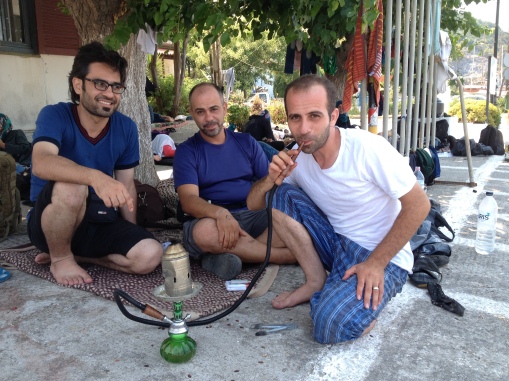
Image: Somethings are too important not to carry!
But there is little chance to rest and there is no provision here that allows the refugees to recover from their journey to Samos. Instead, the policy now is to move the Syrians on the next available boat to Athens. Some will stay on the island for as little as a couple of hours and few are here longer than 36 hours. This is today. As the summer tourist season peaks it will come as no surprise if the ferry companies begin to restrict refugee numbers even though they pay for their ticket, often at a higher price, just like any other passenger.
We have met no one who thinks Athens is going to be easy, we don’t think many realise what hell is waiting for most of them. There is simply nothing there for them except hassle. But to make matters worse they will hit the streets of Athens exhausted. Many are tired when they arrive on Samos. Very tired. This morning Jumana, a teacher of English from Damascus, told us that she had not slept for 48 hours. For over 30 hours they were kept in a remote area of a forest without food and water before they were taken to the beach to leave for Samos.
Now we are hearing more stories about the difficulties refugees are facing in Turkey. By closing its borders Turkey has made it more difficult for the refugees trying to get out of Syria. “The government hate us now in Turkey. When we left Syria we had to come ‘underground’ just like coming to Samos. Me and my brother had to crawl through thorn bushes to avoid the Turkish border police. They would have beaten and robbed us if we got caught. [ The brothers then showed us the deep scratch marks on their legs which resulted from their crawl over the border between Syria and Turkey. They were 2 hours on their bellies.] We have not slept in a bed for 3 weeks.” Another young couple with a 4 month old baby and a 2 year old toddler told us that they spent a frightening 20 hours crossing the border into Turkey. It is little wonder that so many of the children and babies sleep deeply on the ground when they finally get to stop at the ports. But there are no beds just blankets on the ground all of which have been donated by local people.
Visible
Because the ferries run every other day, some of the Syrian refugees have to spend the night sleeping on the ground outside near to the Port Police buildings. For the first time the refugees are now clearly visible on the island, not only because they are gathered in large groups around the port but also because they can be seen walking on the road connecting the 2 ports. The police do not have the buses to move the refugees quickly from their landing places to the ports so they ask them to walk until they can be picked up. So every morning you see groups of refugees walking on the island’s main road, either to Karlovassi or Vathi.
The previous concern of the authorities to keep all the refugees contained out of sight locked in the camp is in ruins. The refugees are now visible on Samos. The areas around the 2 harbours look like giant laundries with every fence being used to dry out clothes and luggage. You can’t miss their presence now.
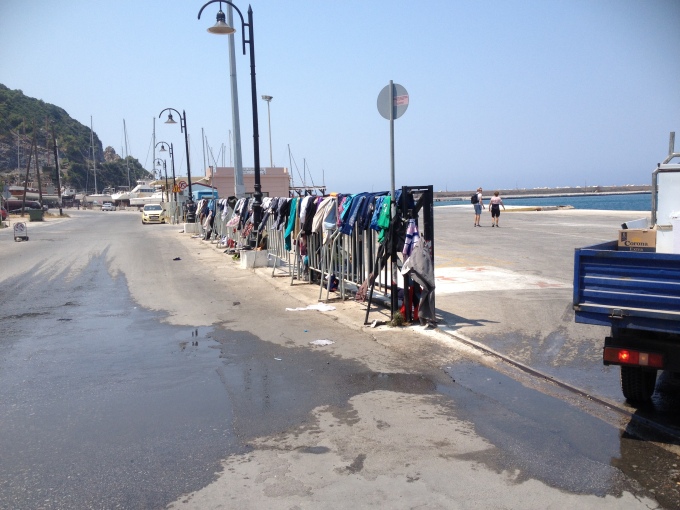
Image: Clothes drying on the fence at Karlovassi Port
For the refugees this has brought some direct benefits as many locals despite their own difficulties have responded generously. We see everyday locals bringing them food and water paid from their own pockets. Yesterday we saw someone drop off a car load of toys for the children. Tourists too make significant contributions in providing water and food and some have taken to collecting fruits from the vegetable shops at knock down prices. We see many acts of kindness and simple humanity that deepen and become more effective as locals and tourists meet and talk with the refugees. By talking we get to know their most pressing needs. There is no need for us or any group to be telling people here how to help the refugees other than say come on down to the port to see what you can do. The refugees can tell us what they need most.
One consequence is that confidence builds. There is still some confusion as to whether the police will arrest anyone seen helping the refugees. We have heard of no such police action recently. But there is still some fear around. Even so we now see people stopping to pick up the refugees walking to the ports and then coming back for more. As one young local driver told us he didn’t give a damn about any law. He wasn’t going to pass people who so clearly needed a ride.
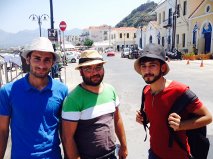
Nice Hats Guys!
Everyday new contacts are being made between refugees and the islanders and every time this happens, with few very exceptions, humanity is strengthened. Through a range of often brief encounters – giving food or water for example there is a coming together of human beings. Again and again we hear locals saying “they are just like us.”
Some of the cafés and bars near to the ports are also being brilliant in allowing the refugees to use their toilets and to re-charge their phones and access their wi fi. This is very important for one of their priorities on arrival is to let their friends and families know that they are safe: “My mum will be out of her mind with worry. I called her when we left the beach in Turkey last night. I have to call her to tell her I am safe” (Mamoud, Syrian student from Latakia asking us where he could charge his phone).
For some businesses on Samos the refugees are bringing them super profits. This week for example, we learnt from the refugees that they were being charged 10 euros (adult) or 5 euros (child) to take them from Karlovassi to Vathi to catch the evening boat. These buses are chartered by the police. These prices are twice as much as the cost on the regular public bus. And unlike the public buses they pack the refugees on the charter buses. So a bus licensed to carry 45 people takes 60. We calculated that each trip between the two ports generated an income in the region of 500 euros. We have just heard that some taxis are also cashing in and charging 50 euros a head to take them from Karlovassi to Vathi. With 5 in a taxi that is 250 euros for a half hour ride that normally costs 40 euros for the whole car.
Solidarity and Survival
Generating and deepening solidarities between the refugees and also with the locals including the front line port police and coastguards remains a theme of our interventions. Without these solidarities the refugee situation becomes even worse. Many already know this, which is why we find very few refugees traveling on their own. Most are traveling with friends and relatives in groups from 3 to 8. In a group they are less likely to be victims of rip offs whether on Samos or further down the road in Athens, Macedonia or wherever.
It seems to us that the most effective way of deepening solidarities is often by doing things together. This includes distributing food and water and most importantly in keeping the port areas where they are gathered clean. In Karlovassi port we are now able to use a small port police building of 3 rooms and a single toilet. Until 10 days ago it had been abandoned, since the water pipes had burst. As the only closed space near to them it had degenerated into an open sewer and a monumental public health hazard both for the refugees who waited and slept outside as well as to the police working there and the hundreds of passengers using the ferries. A full morning’s work however got it cleaned out and disinfected, and a temporary hose pipe put in. The refugees now work to keep both the toilet and all the rooms clean. There is also some electricity to one of the rooms which is used for charging phones. Most of the time ( though not always!) when the refugees leave on the ferries, the area is cleaned up ready for the next arrivals.
A few days ago we heard of an outbreak of TB amongst some police officers on Chios. This frightens people. It also plays into sterotypes about disease carrying refugees. With high summer temperatures and a lack of good hygiene facilities it is not so easy to keep yourself clean. We do all we can to help the refugees get rested, clean and healthy. It would be good to see some doctors and nurses coming to the ports. They are needed.
The building is not great but at least it is better than nothing. Sea soaked clothes can be washed, people can clean themselves and there is a toilet. At the time of writing there is a group of women from Karlovassi who are optimistic that they are to be given some money from a concerned donor on nearby Patmos island and they are planning to use this to install another toilet and a shower. The range of the help is getting wider. Some shops have collecting boxes and also gather clothes, some pharmacies give generous discounts, some hotels send food as do some bakeries and on more than one occasion local restaurants have provided over 150 meals at very short notice.
Changing Behaviour
Only a few weeks before the police were clearly nervous and afraid of the refugees. Most of the time it is only one officer at the port trying to deal with over a hundred and sometime two hundredrefugees.They are simply overwhelmed by numbers. Now things are changing. The daily arrivals continue but the behaviour of the police is changing. They see the refugees organise themselves to help themselves, keeping the place clean, washing out the building, washing and drying their clothes, passing food around and so on. (Because of the daily turn over of arrivals it has not yet been possible to ensure consistency on all these issues. We have much to learn.)
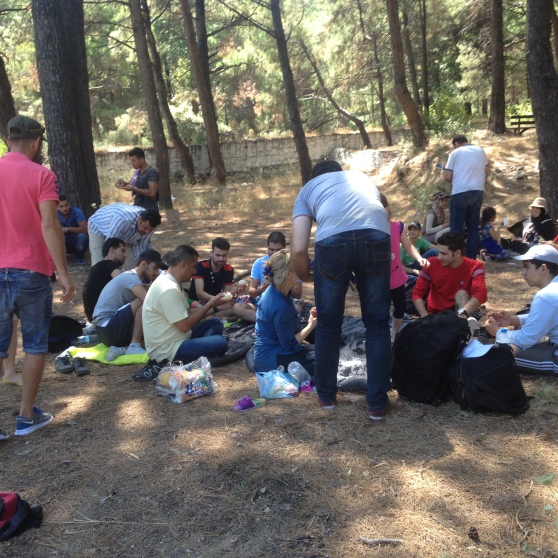
Image: Cakes for Eid in Agios Konstantinos
Maybe small steps but it is good to see the port police working with the refugees as they hand out the white papers for onward travel to Athens. Refugees are much better at reading the names and calling them out than the police. When the refugees do it there is much less shouting and chaos. Yesterday, a group of nearly a hundred refugees had a collection and gave the port police an envelope with some hundreds of euros so that they could have some money to buy things for the refugees who follow rather than having to use their own money.
Direct contact with the refugees is more than about meeting immediate practical needs. They want and need to talk about their experiences just as we want and need to talk to them and find out what is going on. In this context relationships can develop quickly as you find yourself talking about the destruction of their homes and lives in Syria or Iraq, the family members they have left behind, the relatives and friends who have died and the journeys from Syria through to Samos. There are many high school and university students amongst the Syrians at the moment. To resume their studies is a huge concern to them and often determines their choice of Germany as an end destination. DAESH/ISIS also figures high in the conversations. Many are terrified of DIAS especially a group of 16 year old boys who had seen their school friends taken by ISIS.
But there is also the banter and jokes with the young guys whether it is about their tattoos, or their hats! On the day of Eid we partied on cakes with over fifty newly arrived Syrians in the forest by Agios Konstantinos. There were enough of these cakes, bought by a refugee who has been on the island for some years, to take to the Port Police in Vathi so they could also participate in Eid. Even in these difficult circumstances it is important to create happiness whenever we can.

